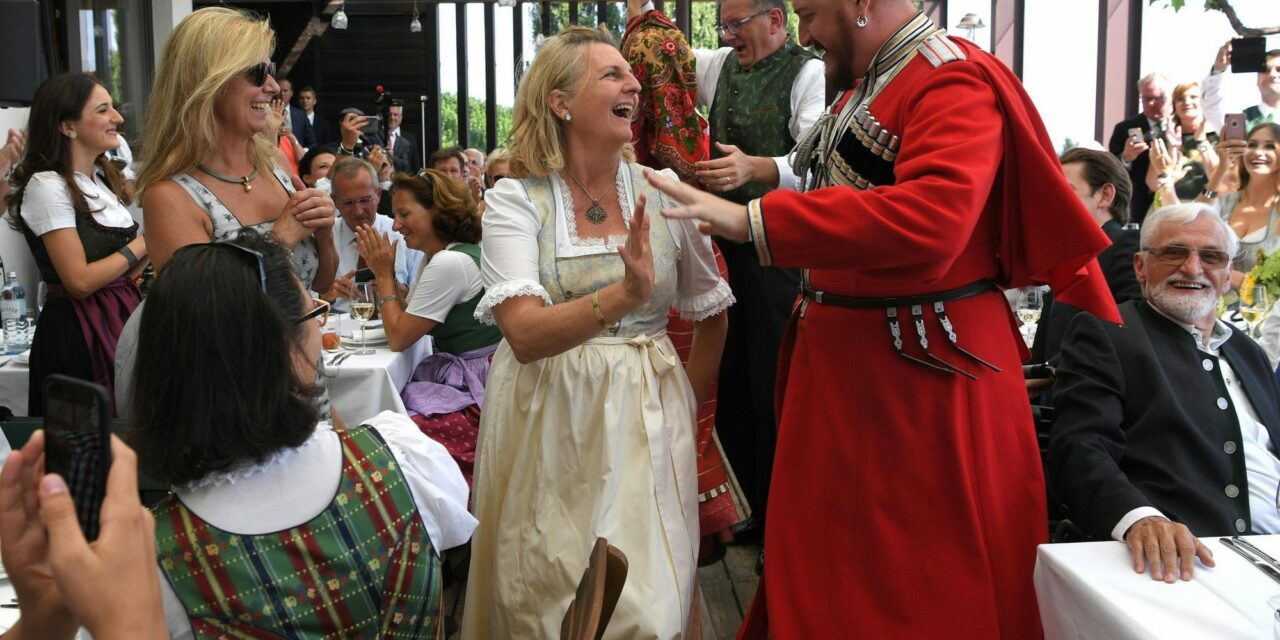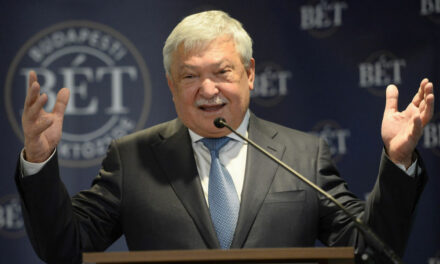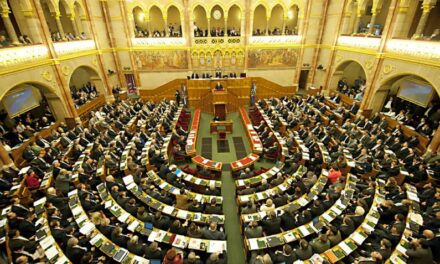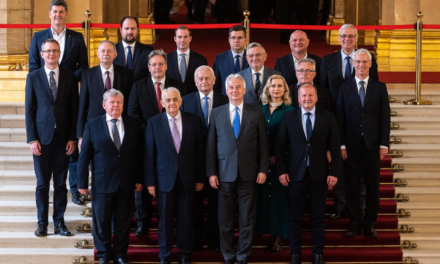Vienna has been rather ambivalent towards Russia since Vladimir Putin launched a war against Ukraine last year. The Austrians do not want to be seen as Moscow's allies, but they are also wary of causing lasting damage to a relationship that has been quite profitable for them for decades, writes Politico .
Although it is true that Austria supported Ukraine with significant humanitarian aid, took in a large number of refugees, contributed to the European Union's sanctions against Russia, and publicly criticized Putin for violating international norms,
but behind the scenes, trade relations between the two countries remained strong, particularly in energy and finance.
When Austrian Chancellor Karl Nehammer decided last April to become the first European leader to fly to Moscow (via Kiev) and meet Putin in person after the invasion, he apostrophized it as a peace mission. According to his critics, the chancellor only wanted to ensure the further flow of Russian gas to Austria, notes the Brussels paper. At the same time, many see the Alpine country as a "disruptor of European unity".
According to Foreign Minister Alexander Schallenberg, however, Austria not only threatens European unity, but actually strengthens it. " Since February 24 of last year, Chancellor Nehammer and I have made it crystal clear what the country is and what our government's position is, " he said. He added: " For small, export-dependent countries like Austria, it is essential to respect international law and the principle of pacta sunt servanda ", referring to one of the traditional principles of the law of obligations, according to which agreements are binding on the parties.
According to Politico, to understand the roots of Austria's stance towards Russia, we need to look back to 1955. A decade after the end of World War II, the country was still occupied and divided into zones by the four Allied powers. The Soviets were only willing to restore the country's sovereignty if it agreed to enshrine its neutrality in its constitution, which the population considered a necessary evil at the time. (The author reminds us: strictly speaking, the law does not prohibit Austria from participating in an armed conflict, rather it stipulates that the country cannot join a military alliance or allow other countries to station troops on its territory.)
Caught between NATO and the Soviet bloc, Austria did not have to wait long to discover the advantages inherent in its new position. As a neutral, non-aligned country, it could make deals on both sides of the Iron Curtain.
On June 1, 1968, Austria became the first Western European country to sign a long-term contract with the Soviet Union for the supply of natural gas, which arrived via Czechoslovakia to a distribution center just inside the Austrian border.
The events in Prague in 1968 had already put their plans in jeopardy. Memories of the defeat of the Hungarian War of Independence were still fresh, and the Austrians feared that the Soviets might even invade their country. The government even prepared emergency plans for moving from Vienna to the western part of the country. He was also careful not to provoke the Soviets and kept the Austrian troops within 30 kilometers of the Czechoslovak border. (They were right to worry. The Soviets had a plan to send Warsaw Pact troops across the border, but decided not to, for reasons still unclear.)
This was a defining moment for Austria in the Cold War – the Soviets did not attack and the gas continued to flow. According to the author, the lesson was clear for most Austrians:
neutrality is good for business and guarantees our safety.
Neutrality also made it possible for Austria to increase its value in the field of international diplomacy. In the 1960s, OPEC moved its headquarters to Vienna, and in 1979, the UN made the Austrian capital its third headquarters. The Organization for Security and Cooperation in Europe was established in the same place in 1993.
The gas business turned out to be a boon for the then state-owned energy industry concern OMV, as it made Austria one of the main "channels" for Russian gas destined for Western Europe. " The economic benefits of the agreement for Austria have been significant for many years, " said former Austrian Vice Chancellor and Finance Minister Wilhelm Molterer.
Meanwhile, the Russian elite saw Austria as the gateway to the Western world for a long time. They knew that Vienna was a place where Russians with money and influence were welcome and could even obtain citizenship here.
The most striking aspect of the political relations between Austria and Russia is actually the extent to which they cross the borders of party politics. One proof of this is that
most Austrian chancellors turned east after leaving office.
Wolfgang Schüssel, the former chancellor of the centre-right People's Party, has joined the board of directors of the Russian mobile telecommunications provider MTS and the oil industry giant Lukoil. His Social Democrat successor, Alfred Gusenbauer, joined a pro-Russian think tank, and another Social Democrat, Christian Kern, joined the board of directors of the Russian state railway company, RZD.
Former ministers also acted similarly. Hans Jörg Schelling, who was Minister of Finance for three years, became an adviser to Gazprom after leaving office. Former Foreign Minister Karin Kneissl, who is also known for hosting Vladimir Putin at his wedding, joined the board of state oil company Rosneft, and became a regular on RT, the Russian international broadcaster.
Despite their political differences, the politicians all agreed that Austria should remain a bridge to Russia. (Most of the above resigned their posts after Russia started the war last year.)
Russia is still the second largest investor in Austria after Germany (since 2014), foreign direct investments amounted to 25 billion euros at the end of last year, which corresponds to 13 percent of all investments.
(For comparison: American investments in Austria amount to 13 billion euros, while those in neighboring Italy amount to about 11 billion euros.)
Meanwhile, the majority of the hundreds of Austrian companies that have invested in Russia in recent years have not abandoned their activities, and nearly two-thirds of them would remain in the country in the long term.
Politico draws attention to the fact that the oil and gas conglomerate OMV, Austria's largest company, remains a significant player in the Russian energy sector. The Austrian-owned Raiffeisen Bank is the largest foreign credit institution operating in Russia and one of the pillars of the country's financial system.
Even Salzburg-based Red Bull continues to distribute energy drinks in Russia.
It is an interesting contradiction that, while OMV - according to the Kurz-Putin agreement of 2018 - is still obliged to buy at least 6 billion cubic meters of Russian gas per year until 2040, the Austrian state, which owns nearly 30 percent of OMV, is obliged to buy at least 6 billion cubic meters of Russian gas every year until 2027 wants to reduce Austria's dependence on Russian gas.
The Austrian position regarding the war in Ukraine has already been criticized by many. In January this year, after Schallenberg warned against excluding Moscow from the Vienna-based OSCE, the Polish Foreign Ministry accused Austria of "pro-Russian" behavior. Polish Deputy Foreign Minister Pawel Jablonski called the Austrians' comments absurd.
At the same time, the US Treasury asked several questions to Raiffeisen Bank regarding its operations in Russia, which many interpreted as a clear message from Washington to Vienna.
And last week, the European Commission called on Austria not to do enough to separate itself from Russian gas
(in recent months, 70 percent of Austria's gas consumption was covered by Russia).
Asked by Politico whether Austria still sees itself as a bridge between Russia and the West, Foreign Minister Schallenberg gave a firm answer. " If you want to act as a bridge, you need two shores. Currently, there is no such thing ," he said, referring to the fact that the possibility of dialogue with Russia, which started the war, is almost impossible.
So far, however, the rhetorical turns have not resulted in major swings in politics
- concludes the author.
Source: hirado.hu
Cover photo: Austrian Foreign Minister Karin Kneissl dances with a member of the Don Cossack Choir at her marriage ceremony in Gamlitz, Styria on August 18, 2018 (Photo: MTI/EPA/Dominik Angerer)












